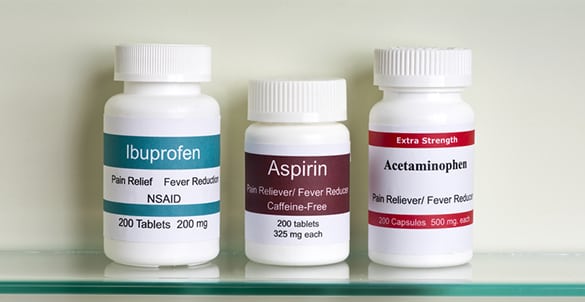
Our doctors can help you to manage AERD.
Related to asthma, aspirin-exacerbated respiratory disease (AERD) is a condition characterized by sensitivity to aspirin that can also extend to other non-steroidal anti-inflammatory drugs (NSAIDs) like ibuprofen (Motrin, Advil) and naproxen (Aleve).
- Considered rare, AERD affects about 5 percent of asthmatics, adults more so than children.
- Reactions experienced can range from minor issues with nasal congestion to severe reactions that include chest tightness or difficulty breathing.
What Causes Aspirin Exacerbated Respiratory Disease
Also referred to as Samter’s Triad, aspirin-exacerbated respiratory disease is most likely to affect individuals with asthma, recurring issues with nasal polyps, or sinus disease. Having an existing sensitivity to aspirin or NSAIDs may also increase the risk of developing AERD. The exact cause of the condition isn’t known.


Possible Symptoms
For patients with asthma or nasal congestion, a possible sign of AERD is if symptoms do not respond as expected to treatments involving NSAIDs. Some individuals with Samter’s Triad develop chronic sinus infections, while others may have a diminished sense of smell. The most common symptoms associated with AERD are adverse reactions to NSAIDs that might include:
- Increased nasal congestion
- Chest tightness, coughing, or wheezing
- Sinus pain
- Frontal headaches
- Skin flushing
- Abdominal discomfort
- Skin rashes
Common Triggers
Approximately 75 percent of individuals with AERD have a tendency to experience respiratory reactions when consuming alcohol. It’s possible for such reactions to occur with even small amounts of alcohol. Other than the use of NSAIDs, potential triggers include changes in weather, viral infections, and exposure to car exhaust and other types of air pollution.
How It’s Diagnosed
Oftentimes, an ear, nose, and throat doctor is able to make a diagnosis of AERD based on observed symptoms and reported reactions to NSAIDs. There are no blood tests that can positively confirm the condition. However, individuals with Samter’s Triad often have elevated levels of an immune cell linked to inflammation (eosinophils) in nasal polyps. Some patients may be given what’s termed an “aspirin challenge” under medical supervision. During this process, aspirin is administered orally or through nasal structures and the patient’s reactions are observed.
How AERD is Treated or Managed
The standard treatment for aspirin-exacerbated respiratory disease is avoidance of NSAIDs. It should be noted that successful treatment for AERD will not affect symptoms specifically related to asthma, nasal congestion, or recurrent polyps. For most patients, it’s safe to take small doses of acetaminophen (Tylenol) as an alternative to aspirin.
When it’s not possible to avoid NSAIDs altogether, aspirin desensitization may be recommended as a treatment option. What’s also termed aspirin therapy starts with the use of a very small dose of aspirin. Dosages are gradually increased to allow the body’s immune system to naturally get used to aspirin. There may be some unpleasant reactions during the initial phase of treatment, although patients are typically supervised during the process. Successful desensitization may result in:
- Less reliance on medications to treat respiratory symptoms related to AERD
- Fewer asthma attacks or symptoms
- Improved ability to smell and taste
- Fewer instances of polyp regrowth or delayed regrowth
Because people with AERD will need to limit their use of NSAIDs, it can be difficult to successfully manage symptoms related to seasonal colds and pre-existing conditions. An ear, nose, and throat specialist can determine if you would likely benefit from aspirin desensitization therapy, especially if you need to take aspirin for heart disease or other medical reasons. Corticosteroids may help keep underlying conditions such as sinusitis and asthma in check, while surgery may be recommended for nasal polyps.


